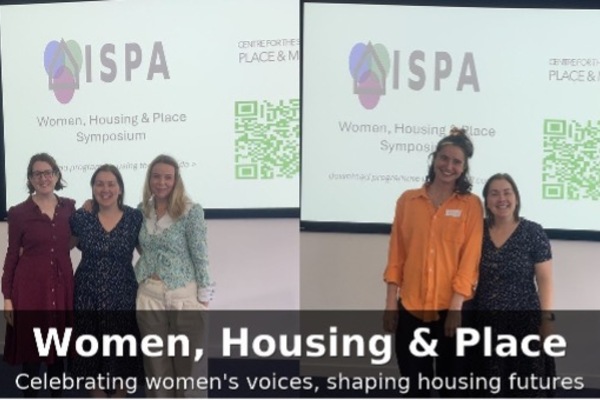Craig Gurney from the School of Geography and Planning at Cardiff University reflects on his experience of the HSA 2019 conference and his return to the HSA circuit.
The 2019 Housing Studies Association conference was recently held in Sheffield on the theme “Home Struggles: politics, marginality and resistance in the contest for housing”. Jenny Hoolachan (Cardiff University) and Ryan Powell (Sheffield University) are to be congratulated on selecting such an inspirational topic which produced a conference of remarkable quality. The quantity of research reported at the conference merits further comment. There were 104 presentations spread across 36 workshop sessions with a further six keynote addresses held in three plenaries. The conference programme stretched to a bumper 64 pages and contained more than 100 abstracts.
With six parallel workshop streams and so much networking and catching up to do (more on that later) any conference review is bound to be partial (Jenny Preece’s review on the CaCHE website and Yoric Irving-Clarke’s blog on the CIH website offer alternative perspectives and #hsa19 on Twitter provides further highlights) so what follows are my personal reflections of the event.
Every presentation which I attended made a concerted effort to address the conference theme. Narratives of resistance, marginality and precarity were evident in countless critical reflections around the meaning and experience of home which I’m sure will be played out in journal papers over the coming years. On reflection, three themes stood out: Control, Security and Praxis. I shall briefly reflect on each before concluding with some remarks about how this conference compared to the last HSA conference I attended.
Hazel Easthope set the tone for the conference in the opening plenary. She argued that “when people lose control of their homes, they lose control of their lives”. This was the basis for a paper which problematised control and made important theoretical connections to housing policy as emotional politics. Like all important conceptual ideas, once you see them, they’re everywhere. I saw the struggle to maintain or to reassert control over a home space in a number of subsequent presentations, for instance; Adriana Soaita used assemblage theory to explain how a sense of home can be sustained in the private rented sector and Christian Zielinski’s research reported the lack of control international students experience in relation to their housing. If we are serious about rethinking and reconceptualising home an important first step should surely be to reconsider how control can be exercised or resisted there. The critical geographies of home tradition (see Blunt and Varley 2004, Baxter and Brickell 2014 for instance) reminds us to think of the “unbounded home” and that housing researchers and policy-makers should remember to look beyond the front door and the porch when thinking about home. Control is scalar. Home is community and neighbourhood, not just dwelling. Michele Lancione’s incisive plenary paper at the end of the conference was a timely reminder of this.
Security was a second theme which stood out. Lyn Richards (1990) once remarked that security is an “international keyword” in accounts of home. Discussions of financial security and precarity, security of tenure, physical security and emotional security featured in a number of papers (Paul Watt, Matthew Howell, Bev James et al for instance). My own paper considered an early sighting of ontological (in)security in RD Laing’s work and suggested directions for further work on mental health and home. Similarly, recently published CaCHE research by Preece and Bimpson (2019) – both of whom were at the conference but speaking on other work – sketches out the dimensions of housing insecurity and mental health. For them, financial insecurity, spatial insecurity and relational insecurity merit further consideration. Thirty years after Peter Saunders (1989) argued that home owners derive a sense of ontological security from their tenure whilst tenants experienced an alienation from home, housing researchers are still interested in home and security. The debate is much more sophisticated and nuanced now but at the HSA 2019 conference, discussions of security and home were still on the agenda.
Finally, praxis: by which I mean the formal and informal resistance to the absence of control over home or to insecurities of home could also be identified in a number of papers. The focus on the “struggle for home” in the conference title suggested contestation, resistance, implementation gaps and, more conceptually, thinking about home as a socially constructed on-going accomplishment. John Grayson’s activist-research paper on G4S’s asylum housing provision and Angela Spinney and Jo Richardson’s comparative paper on the struggle for home amongst Gypsy/Travellers and Indigenous Australians were two examples of research which identified fights for home. These were not fights for housing. We know that home means security and control. We know that home is also an emotion, a feeling state and a source of identity. We need to remember therefore that when people are fighting for their homes they are fighting for their lives.
All things considered then; this was a very good conference. Some inspirational presentations, some fascinating insights and some great ideas. A standard review of a good conference in many respects, except that I’ve not quite finished yet. This was the first HSA conference I’ve attended since I organised the Housing Imaginations conference in Cardiff in 2001 (see Ronald 2002a; 2002b; Winter and Seelig 2002 and Coolen et al 2002 for reviews). My return to the HSA circuit after a break of 18 years provides an opportunity to make some comparative remarks on the HSA conference and on the HSA itself.
Compared to its 2001 counterpart, HSA 2019 seemed more radical (in subject matter and policy solutions), more inclusive (towards early-career researchers and PhD students) and more outward facing (at the 2001 conference Winter and Seelig were critical of the lack of connection between theory and practice and commented on the “small number of participants from policy and practice” (2002, p 117)). Most striking of all though for this delegate, was how much more at ease presenters felt with expressing ideas “outside of the box” to audiences willing to offer critical but helpful support This more radical, more inclusive, more policy-focussed and more supportive HSA is undoubtedly an outcome of the decisions made by the HSA executive committee. For that, those committee members past and present should be proud and the rest of us should be grateful. To end on a very personal note. I travelled to Sheffield to make my HSA “comeback” after a break of 18 years full of trepidation and self-doubt. The welcome I received on arriving, both from old familiar faces and from younger ones I’d not met before, was warmer, more welcoming and more heart-felt than I could ever have hoped for.
Thank you for that. I’ll look forward to seeing you all again next year.
References
Baxter, R. and Brickell, K. (2014) For Home Unmaking. Home Cultures 11 (2): 133-144.
Blunt, A. and Varley, A. (2004) Geographies of home. Cultural Geographies 11, 3–6.
Coolen, H., Kempen, E. and Ozaki, R. (2002) Experiences and Meanings of Dwellings. Housing, Theory and Society 19 (2) pp 114-116.
Preece, J. and Bimpson, E. (2019) Housing Insecurity and mental health in Wales. An evidence review. CaCHE. (Accessed on 24/04/19)
Richards, L. (1990) Nobody’s Home: Dreams and realities in a new suburb, Oxford University Press, Melbourne.
Ronald, R, (2002a) British Housing Studies Association Conference; “Housing Imaginations: new concepts, new theories, new researchers”. HSA Autumn Conference, Cardiff University, September 4th and 5th 2001. Housing, Theory and Society 19 (2) pp 112-113.
Ronald, R. (2002b) Theorising Housing Tenures. Housing, Theory and Society 19 (2) pp 116-117.
Saunders, P. (1989) The meaning of the home in contemporary English culture. Housing Studies 4: 177-192.
Winter, I. and Seelig, T. (2002) Rethinking socio-tenurial transformations. Housing, Theory and Society 19 (2) p 117.







